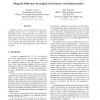Free Online Productivity Tools
i2Speak
i2Symbol
i2OCR
iTex2Img
iWeb2Print
iWeb2Shot
i2Type
iPdf2Split
iPdf2Merge
i2Bopomofo
i2Arabic
i2Style
i2Image
i2PDF
iLatex2Rtf
Sci2ools
ICSE
2003
IEEE-ACM
2003
IEEE-ACM
Pluggable Reflection: Decoupling Meta-Interface and Implementation
Reflection remains a second-class citizen in current programming models, where it's assumed to be imperative and tightly bound to its implementation. In contrast, most object-oriented APIs allow interfaces to vary independently of their implementations. Components take this separation a step further by describing unforeseeable attributes--the key to pluggable third-party components. This paper describes how reflection can benefit from a similar evolutionary path.
| Added | 09 Dec 2009 |
| Updated | 09 Dec 2009 |
| Type | Conference |
| Year | 2003 |
| Where | ICSE |
| Authors | David H. Lorenz, John M. Vlissides |
Comments (0)

